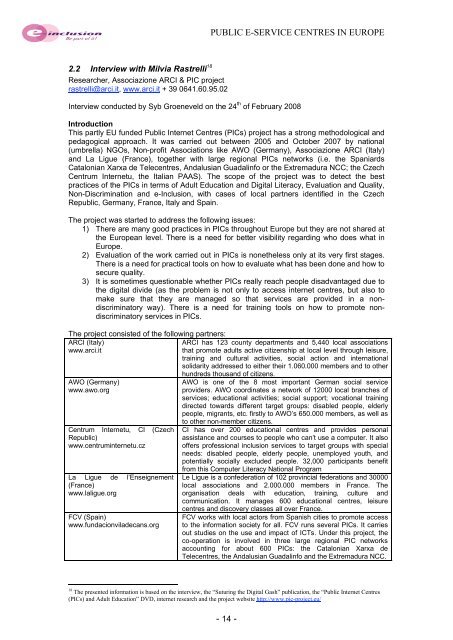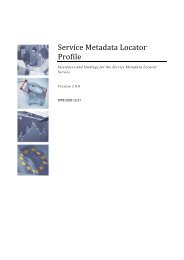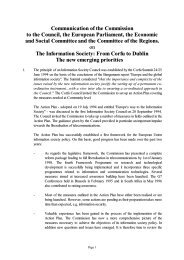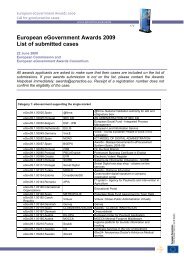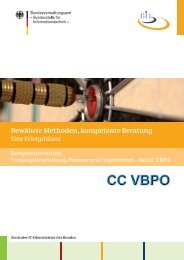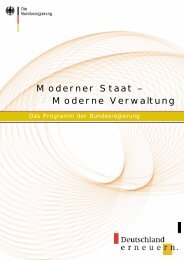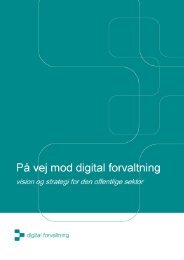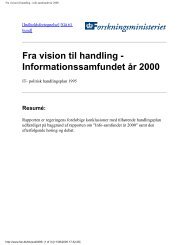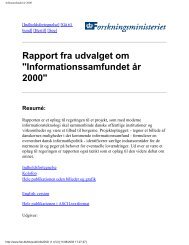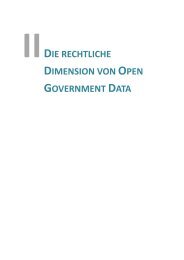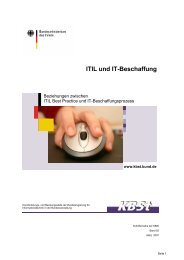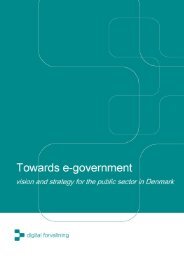Comparative Study of Public e-Service Centres in - ePractice.eu
Comparative Study of Public e-Service Centres in - ePractice.eu
Comparative Study of Public e-Service Centres in - ePractice.eu
You also want an ePaper? Increase the reach of your titles
YUMPU automatically turns print PDFs into web optimized ePapers that Google loves.
2.2 Interview with Milvia Rastrelli 18<br />
Researcher, Associazione ARCI & PIC project<br />
rastrelli@arci.it, www.arci.it + 39 0641.60.95.02<br />
PUBLIC E-SERVICE CENTRES IN EUROPE<br />
Interview conducted by Syb Groeneveld on the 24 th <strong>of</strong> February 2008<br />
Introduction<br />
This partly EU funded <strong>Public</strong> Internet <strong>Centres</strong> (PICs) project has a strong methodological and<br />
pedagogical approach. It was carried out between 2005 and October 2007 by national<br />
(umbrella) NGOs, Non-pr<strong>of</strong>it Associations like AWO (Germany), Associazione ARCI (Italy)<br />
and La Ligue (France), together with large regional PICs networks (i.e. the Spaniards<br />
Catalonian Xarxa de Telecentres, Andalusian Guadal<strong>in</strong>fo or the Extremadura NCC; the Czech<br />
Centrum Internetu, the Italian PAAS). The scope <strong>of</strong> the project was to detect the best<br />
practices <strong>of</strong> the PICs <strong>in</strong> terms <strong>of</strong> Adult Education and Digital Literacy, Evaluation and Quality,<br />
Non-Discrim<strong>in</strong>ation and e-Inclusion, with cases <strong>of</strong> local partners identified <strong>in</strong> the Czech<br />
Republic, Germany, France, Italy and Spa<strong>in</strong>.<br />
The project was started to address the follow<strong>in</strong>g issues:<br />
1) There are many good practices <strong>in</strong> PICs throughout Europe but they are not shared at<br />
the European level. There is a need for better visibility regard<strong>in</strong>g who does what <strong>in</strong><br />
Europe.<br />
2) Evaluation <strong>of</strong> the work carried out <strong>in</strong> PICs is nonetheless only at its very first stages.<br />
There is a need for practical tools on how to evaluate what has been done and how to<br />
secure quality.<br />
3) It is sometimes questionable whether PICs really reach people disadvantaged due to<br />
the digital divide (as the problem is not only to access <strong>in</strong>ternet centres, but also to<br />
make sure that they are managed so that services are provided <strong>in</strong> a nondiscrim<strong>in</strong>atory<br />
way). There is a need for tra<strong>in</strong><strong>in</strong>g tools on how to promote nondiscrim<strong>in</strong>atory<br />
services <strong>in</strong> PICs.<br />
The project consisted <strong>of</strong> the follow<strong>in</strong>g partners:<br />
ARCI (Italy)<br />
www.arci.it<br />
AWO (Germany)<br />
www.awo.org<br />
Centrum Internetu, CI (Czech<br />
Republic)<br />
www.centrum<strong>in</strong>ternetu.cz<br />
La Ligue de l’Enseignement<br />
(France)<br />
www.laligue.org<br />
FCV (Spa<strong>in</strong>)<br />
www.fundacionviladecans.org<br />
ARCI has 123 county departments and 5,440 local associations<br />
that promote adults active citizenship at local level through leisure,<br />
tra<strong>in</strong><strong>in</strong>g and cultural activities, social action and <strong>in</strong>ternational<br />
solidarity addressed to either their 1.060.000 members and to other<br />
hundreds thousand <strong>of</strong> citizens.<br />
AWO is one <strong>of</strong> the 8 most important German social service<br />
providers. AWO coord<strong>in</strong>ates a network <strong>of</strong> 12000 local branches <strong>of</strong><br />
services; educational activities; social support; vocational tra<strong>in</strong><strong>in</strong>g<br />
directed towards different target groups: disabled people, elderly<br />
people, migrants, etc. firstly to AWO’s 650.000 members, as well as<br />
to other non-member citizens.<br />
CI has over 200 educational centres and provides personal<br />
assistance and courses to people who can’t use a computer. It also<br />
<strong>of</strong>fers pr<strong>of</strong>essional <strong>in</strong>clusion services to target groups with special<br />
needs: disabled people, elderly people, unemployed youth, and<br />
potentially socially excluded people. 32,000 participants benefit<br />
from this Computer Literacy National Program<br />
Le Ligue is a confederation <strong>of</strong> 102 prov<strong>in</strong>cial federations and 30000<br />
local associations and 2.000.000 members <strong>in</strong> France. The<br />
organisation deals with education, tra<strong>in</strong><strong>in</strong>g, culture and<br />
communication. It manages 600 educational centres, leisure<br />
centres and discovery classes all over France.<br />
FCV works with local actors from Spanish cities to promote access<br />
to the <strong>in</strong>formation society for all. FCV runs several PICs. It carries<br />
out studies on the use and impact <strong>of</strong> ICTs. Under this project, the<br />
co-operation is <strong>in</strong>volved <strong>in</strong> three large regional PIC networks<br />
account<strong>in</strong>g for about 600 PICs: the Catalonian Xarxa de<br />
Telecentres, the Andalusian Guadal<strong>in</strong>fo and the Extremadura NCC.<br />
18 The presented <strong>in</strong>formation is based on the <strong>in</strong>terview, the “Sutur<strong>in</strong>g the Digital Gash” publication, the “<strong>Public</strong> Internet <strong>Centres</strong><br />
(PICs) and Adult Education” DVD, <strong>in</strong>ternet research and the project website http://www.pic-project.<strong>eu</strong>/<br />
- 14 -


